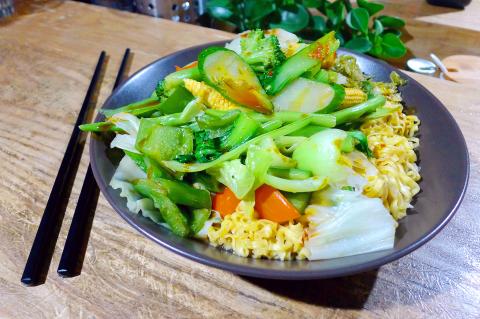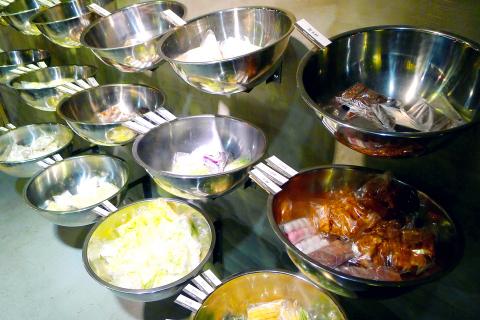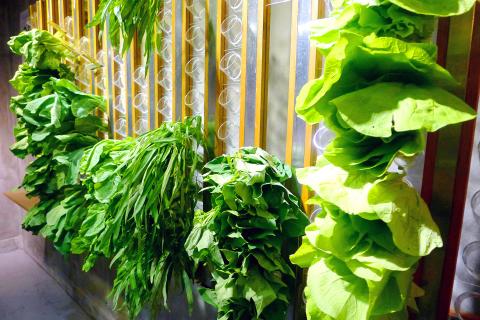Let’s face it, vegetarianism is trendy and even the manliest of men are turning, if only just occasionally, to nutrient-rich and plant-based meals. Whether you are a vegan, vegetarian or simply someone looking for a low-fat meal, Vege Creek is an ideal option.
Vege Creek is the right blend of East meets West, and you get this impression as soon as you walk in the door. Its ultra-modern design concept strips the space down to the bare essentials. Exposed concrete walls and ceiling lends the tiny interior an industrial vibe, and is tempered by long sheets of honey wood, adding a touch of warmth. A small island in the middle of the room is constructed from polished wood. Vege Creek can only sit 10 customers, so you might wait a few minutes if you come during peak hours. Take-out is also available.
Along one wall, large metal bowls are fastened to the wall and in them sit uncooked and pre-packaged ingredients (NT$35 each). Vegetable options include, but are not limited to, carrots, green peppers, several varieties of mushroom, fermented and dried tofu, rice balls, fish balls, baby corn, okra, bamboo, green beans, cabbage, cucumbers, broccoli, seaweed, fungus and pumpkin.

Photo: Olivia Wycech
A stunning green wall of leafy vegetables lines the adjacent wall. It almost looks like a vertical garden, except that the vegetables are bundled and sit in plastic cylinders. Each row is a different type of plant, and on the day I visited there were eight to choose from. The labels are all in Chinese but I recognized sweet potato leaves, bok choy, water spinach, Chinese cabbage and rape. Each bundle costs NT$35.
A little further over, a small case contains small wooden chips in a variety of colors. Each color represents a different type of noodle that will eventually get prepared with everything else in your basket. If you can’t read Chinese you needn’t grab one. Simply ask the staff to show you what they have when you get to the counter. There are five different types of noodles and all are egg and dairy-free. You can choose between rice noodles, wheat noodles, ramen noodles and green bean noodles. Each package of noodles is NT$20.
But be warned: It’s easy to get carried away with the ingredients when they are separated. That’s what happened to me, and my bowl eventually contained way more than I could eat and cost me NT$200. Black tea is also available for NT$25. Vege Creek’s standout broth is a clean and simple brew of Chinese medicinal herbs, salt and pepper. There is no oil masking any flavors, nor making you feel heavy, no MSG and no fat. As I slurped it down, I kept asking the staff if they were positive there wasn’t anything else in it. I couldn’t believe it wasn’t beef.

Photo: Olivia Wycech
The noodles and vegetables are cooked in the broth just long enough so they tenderize and swallow up some of the flavor, yet still remain firm. Everything is then transferred into a bowl and is topped with more broth. There is an ever so slightly spicy soy sauce that is drizzled over the dish, and a few strips of dried seaweed add the finishing touches to a gorgeous bowl of noodles.
Vege Creek also offers an interesting health-conscious lunch special, which includes three options for NT$99 and falls between 350 to 500 calories depending on your choices. Each set includes one type of noodle, two green vegetables, and either tofu, taro and a rice cake, or pumpkin, fungus and konjac, or a mushroom medley.

Photo: Olivia Wycech

On April 26, The Lancet published a letter from two doctors at Taichung-based China Medical University Hospital (CMUH) warning that “Taiwan’s Health Care System is on the Brink of Collapse.” The authors said that “Years of policy inaction and mismanagement of resources have led to the National Health Insurance system operating under unsustainable conditions.” The pushback was immediate. Errors in the paper were quickly identified and publicized, to discredit the authors (the hospital apologized). CNA reported that CMUH said the letter described Taiwan in 2021 as having 62 nurses per 10,000 people, when the correct number was 78 nurses per 10,000

As we live longer, our risk of cognitive impairment is increasing. How can we delay the onset of symptoms? Do we have to give up every indulgence or can small changes make a difference? We asked neurologists for tips on how to keep our brains healthy for life. TAKE CARE OF YOUR HEALTH “All of the sensible things that apply to bodily health apply to brain health,” says Suzanne O’Sullivan, a consultant in neurology at the National Hospital for Neurology and Neurosurgery in London, and the author of The Age of Diagnosis. “When you’re 20, you can get away with absolute

May 5 to May 11 What started out as friction between Taiwanese students at Taichung First High School and a Japanese head cook escalated dramatically over the first two weeks of May 1927. It began on April 30 when the cook’s wife knew that lotus starch used in that night’s dinner had rat feces in it, but failed to inform staff until the meal was already prepared. The students believed that her silence was intentional, and filed a complaint. The school’s Japanese administrators sided with the cook’s family, dismissing the students as troublemakers and clamping down on their freedoms — with

As Donald Trump’s executive order in March led to the shuttering of Voice of America (VOA) — the global broadcaster whose roots date back to the fight against Nazi propaganda — he quickly attracted support from figures not used to aligning themselves with any US administration. Trump had ordered the US Agency for Global Media, the federal agency that funds VOA and other groups promoting independent journalism overseas, to be “eliminated to the maximum extent consistent with applicable law.” The decision suddenly halted programming in 49 languages to more than 425 million people. In Moscow, Margarita Simonyan, the hardline editor-in-chief of the